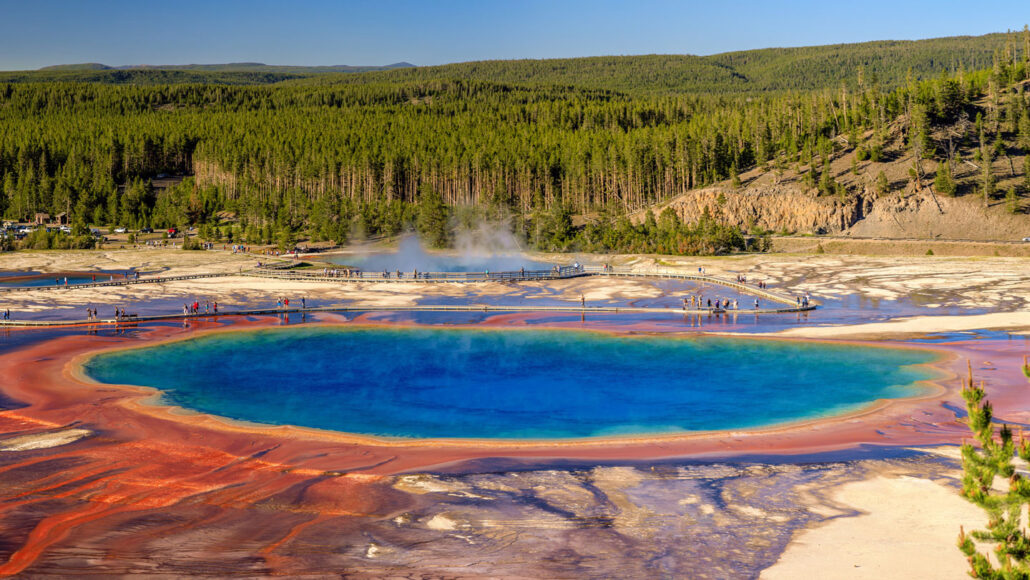bacteria: (singular: bacterium) Single-celled organisms. These dwell nearly everywhere on Earth, from the bottom of the sea to inside other living organisms (such as plants and animals). Bacteria are one of the three domains of life on Earth.
bacterial: Having to do with bacteria, single-celled organisms. These dwell nearly everywhere on Earth, from the bottom of the sea to inside animals.
bacterium: (pl. bacteria) A single-celled organism. These dwell nearly everywhere on Earth, from the bottom of the sea to inside of plants and animals.
behavior: The way something, often a person or other organism, acts towards others, or conducts itself.
cell: (in biology) The smallest structural and functional unit of an organism. Typically too small to see with the unaided eye, it consists of a watery fluid surrounded by a membrane or wall. Depending on their size, animals are made of anywhere from thousands to trillions of cells. Most organisms, such as yeasts, molds, bacteria and some algae, are composed of only one cell. (in telecommunications) A technology that relies on a large number of base stations to relay signals. Each base station covers only a small area, which is known as a cell. Phones that rely on this system are typically referred to as cell phones.
cholera: A bacterial disease that infects the small intestine, causing severe diarrhea, vomiting and dehydration. It is spread by germs from feces that contaminate water or food.
digest: (noun: digestion) To break down food into simple compounds that the body can absorb and use for growth. Some sewage-treatment plants harness microbes to digest — or degrade — wastes so that the breakdown products can be recycled for use elsewhere in the environment.
eukaryote: Any organism whose cells have a nucleus. Eukaryotes include all multicellular creatures (such as plants, animals and fungi) as well as certain types of single-celled microorganisms.
gut: An informal term for the gastrointestinal tract, especially the intestines.
infection: A disease that can spread from one organism to another. It’s usually caused by some type of microbe.
microbe: Short for microorganism. A living thing that is too small to see with the unaided eye, including bacteria, some fungi and many other organisms such as amoebas. Most consist of a single cell.
microbiome: The scientific term for the entirety of the microorganisms — bacteria, viruses, fungi and more — that take up permanent residence within the body of a human or other animal.
microscopic: An adjective for things too small to be seen by the unaided eye. It takes a microscope to view objects this small, such as bacteria or other one-celled organisms.
nucleus: Plural is nuclei. (in biology) A dense structure present in many cells. Typically a single rounded structure encased within a membrane, the nucleus contains the genetic information.
organelle: Specialized structures, such as mitochondria, found within a cell.
organism: Any living thing, from elephants and plants to bacteria and other types of single-celled life.
pathogen: An organism that causes disease.
prokaryote: Any single-celled organism that does not have a nucleus or membrane-bound organelles.
strep: Short for streptococcus. This is a family of bacteria — some of which can cause a fever, swollen tonsils and a severe sore throat, especially in children.
strep throat: A bacterial infection caused by A Streptococcus germs. Symptoms include a sore throat, pain when swallowing, swollen tonsils and a fever of at least 101 degrees Fahrenheit (38.3 degrees Celsius). People may also develop spots on the roof of the mouth. The disease can be treated with antibiotics to kill the bacteria.
tetanus: An unusual type of bacterial infection that usually does not spread between infected individuals. The source of these germs is typically exposure to soil, dust or animal feces. The disease causes stiff, painful muscles throughout the body, including a cramping in the jaw (which is why it’s sometimes called “lockjaw”). Fevers, seizures, sweating and headaches may also occur.








